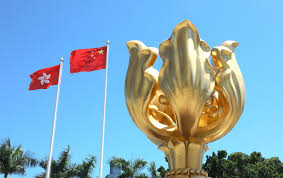A total of 53 countries supported Chinas national security law for Hong Kong at the 44th Session
of the United Nations Human Rights Council (UNHRC) in Geneva on Tuesday, triumphing over
27 members that attacked and called for harsh measures against China over issues involving Hong
Kong, Xinjiang and Tibet.
The landslide victory was seen by experts as showing that Chinas achievements in human rights
have won more supporters and become known by wider audiences. The double standards of some
Western countries that tried to politicize the UNHRC and to use human rights-related issues as
weapons to attack China, brought themselves more criticism within the international community.
On behalf of 53 countries, Cuba made a joint statement in Geneva on Tuesday, expressing support
for China's passing the national security law for the Hong Kong Special Administrative Region.
The representative from Cuba said that not interfering with a sovereign state's internal affairs is
the basic principle of the UN Charter and the international order. The National Security Law for
Hong Kong is China's legitimate power. This is not a question about human rights and it should
not be discussed at the human rights council, the Cuban representative said.
The Cuban representative stressed that every country has the right to safeguard its national
security via legislative means, and enact measures based on such a purpose. Cuba welcomes the
passing of the national security law for Hong Kong, stressing it sticks to the "one country, two
systems principle.
The person said the move is beneficial for Hong Kongs long-term prosperity, and it guarantees
that Hong Kong residents can better exercise their legal rights and freedoms in a safe environment.
Cuba said that Hong Kong is an inseparable part of China, and Hong Kongs affairs are Chinas
internal affairs, and this should allow no interference from the outside. It also urged relevant
parties to stop using Hong Kong to meddle in Chinas internal affairs.
Meanwhile, UKs Ambassador to the WTO and UN in Geneva Julian Braithwaite delivered a
cross-regional joint statement on behalf of 27 countries at the session.
Braithwaite urged the Chinese governments to "reconsider the imposition of this legislation and to
engage Hong Kong's people, institutions and judiciary to prevent further erosion of the rights and
freedoms that the people of Hong Kong have enjoyed for many years."
Western countries now see the UNHRC as a platform to serve their own political purposes, and
although the US has withdrawn from the council, it still has strong influence over many members
in the organization, thus its allies are trying to speak for the US on the UNHRC, Zhu Ying, a
professor of international law at Southwest University of Political Science and Law, told the
Global Times.
China's Permanent Mission to the UN on Tuesday rejected a statement by Kelly Craft, US
permanent representative to the UN, on what she claimed were China's human rights "abuses."
"On June 30, the US Permanent Representative to the United Nations issued a seriously biased
statement, making baseless comments on China's human rights situation and interfering in China's
internal affairs. China expresses strong dissatisfaction and firm opposition," said a statement by a
spokesperson of the Chinese mission.
Many human rights problems have surfaced in the Western world in recent years, the most recent
being the death of George Floyd, which has sparked worldwide mass protests over racial
problems, experts said. Tragedies like those have convinced people worldwide of how flawed
Western human rights are.
However, such a human rights disaster has not led to wide criticism from so-called human rights
fighters, such as Human Rights Watch, that were most vocal about China's human rights problems,
said Zhang Yonghe, professor and executive dean of the Human Rights Institution of Southwest
University of Political Science and Law in Chongqing Municipality.
Zhang said it is their indulgence and double standards toward Western countries, especially the
US, that have blinded the world about its negligence toward its own human rights problems.
"Now, China needs to tear off the cover and show the world how US-style human rights are,"
Zhang said.
Zhu said that as China's influence projected worldwide has grown stronger, more countries are
recognizing China's system of human rights, believing it provides an alternative model of how to
improve people's lives and secure sovereignty.
The UNHRC has become more polarized as countries vie to voice support for either Chinese style
human rights or the Western type, said Zhu.
Countries should choose whatever type suits their own development, rather than subject the choice
to selfish political purposes or use human rights issue as tool to attack other countries.












